I wanted to revisit this post on the growing meme of President Barack Obama as weak and vacillating, in which I said that on Israel-Palestine, Afghanistan and Iran, “there definitely seems to be a hesitation on following through on initial convictions and openings. . . . Obama has blinked.” Because in trying to address a number of interconnected trains of thought, I might have crossed some of the tracks up. To begin with, on Afghanistan, I don’t think Obama is wrong to pause and consider the strategic objectives before signing off on the resources requested. The problem is that I […]
Afghanistan Archive
Free Newsletter
Let’s face it, the meme that’s currently taking shape is that President Barack Obama is weak and vascillating. And that’s a particularly lethal meme for a foreign policy oriented around engagement, cooperation, shared responsibility and a careful husbanding of dwindling U.S. power resources. Is it a fair characterization? It leaves out a number of policy positions where he has taken bold initiatives and followed them up well. His nuclear nonproliferation agenda, for instance, which I initially dismissed but have since come to appreciate, offers promising openings on a number of fronts. His handling of the much-needed U.S. image makeover, too, […]
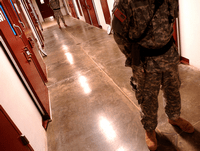
The term “lawfare” is increasingly used to characterize the pervasive role of law in the conduct of war, but there is nothing new about the concept. Law has always played a role in war, requiring that a pragmatic balance be struck between the necessities of war and the need to protect the innocent. The significance of this balance between military necessity and humane treatment under the law has never been more central to the credibility of U.S. military operations than it is today. The real question raised today is whether “lawfare” will come to define a fundamental distortion of this […]
NATO’s new secretary general says thealliance remains committed to the fight in Afghanistan, despite greaterviolence in the country and a rising death toll among U.S. and NATOtroops. Monday in Washington, Anders Fogh Rasmussen said the need formore resources to battle Taliban militants comes at a time when publicsupport for continued operations in Afghanistan is waning in manyallied nations. VOA’s Michael Bowman reports from Washington.

BERLIN — After four years of an uncomfortable alliance with the liberal Social Democratic Party marked more by inaction that by any major initiatives, German Chancellor Angela Merkel and her conservative Christian Democrat party won a sweeping victory in federal elections here yesterday, putting the legislative pieces in place to make significant policy changes in her second term. The pro-business Free Democrats pulled off a major upset, winning enough votes to form a grand coalition with the CDU. Meanwhile, the election marked a major defeat for the SDP, with party candidate Frank-Walter Steinmeier calling for a reassessment of the party’s […]
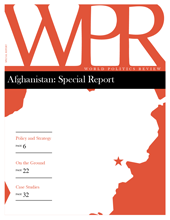
This WPR special report on the Afghanistan war compiles news, analysis and opinion from WPR’s pages to provide insight into the situation on the ground, as well as the strategic questions faced by U.S. and coalition policymakers. Contributors to the report include, Spencer Ackerman, David Axe, Andrew Bast, Andrew Exum, Joshua Foust, Judah Grunstein, Seth Rosen, Vikram Singh, Hampton Stephens, Balint Szlanko, and Richard Weitz. Below are links to each article, which subscribers can read in full. Subscribers can also download a pdf version of the report. Not a subscriber? Subscribe now, or try our subscription service for free. Abu […]
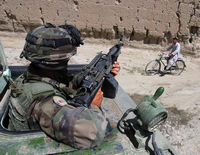
The armored truck came apart in a puff of smoke and debris. It was Aug. 20, election day in Wardak province, Afghanistan, southwest of Kabul. U.S.-led forces in Afghanistan had braced for increased levels of violence on this day. But the massive bomb — constructed of a plastic barrel with a nitrate fertilizer filler — that struck the American truck was more than anyone expected. Of the two U.S. Army soldiers riding in the front of the vehicle when the bomb struck, one was seriously injured. Specialist Justin Pellerin, 21, the driver, died instantly. Improvised Explosive Devices (IEDs) are taking […]
The Washington Post’s Rajiv Chandrasekaran says Obama is considering a”pretty significant shift in policy” on Afghanistan, from acomprehensive counterinsurgency and nation-buiilding campaign to a muchmore narrowed mission focused on counterterrorism. The fraudulentAfghanistan elections are at least one major factor in precipitatingthis change from March, when the White House promulgated a much moreexpansive Afghanistan strategy.
In this interview with Gary Thomas of Voice of America, CIADirector Leon Panetta says President Hamid Karzai will in alllikelihood still emerge as the winner of the presidentialcontest in Afghanistan, even after contested votes are thrown out.Panetta also says there aredifferences among Iran’s leaders about whether to actually build anuclear bomb, and he talks about the CIA’s reaction to the U.S.attorney general’s investigation into interrogation techniques.
Amid signs that President Barack Obama is reconsidering first principles in Afghanistan, the Washington Post has published a redacted version of the strategic review conducted by Gen. Stanley McChrystal. Most of its principle elements have already emerged since July, but to see them finally gathered and presented in a coherent draft helps clarify the assessment of where things stand. Curiously, I was most impressed and encouraged by the discussion of the Afghan insurgency’s strengths (pp. 2-5/2-8). I found myself thinking that, despite all of the insurgency’s recent advances, our understanding of its various strands, how they overlap, and their lines […]
Spencer Ackerman’s rundown of the Senate Foreign Relations Committee hearing on Afghanistan is well worth a read. Rory Stewart, John Nagl and Stephen Biddle gave testimony. The result is a very informative confrontation between three very different and articulate perspectives of that war. As Ackerman observes, it’s something of a rarity to see informative debate in the Senate.
Most accounts I’ve read of the Afghan security forces have made the distinction between the Afghan army, usually described as needing a lot of improvement but competent and on the right track, and the Afghan police, always described as a disastrous combination of incompetence and corruption. That was at least partly reassuring, since the transfer of security operations to indigenous Afghan forces is a major component of both U.S. COIN doctrine and most optimistic assessments of a long-term (read: politically palatable) U.S. nation-building mission in Afghanistan. Recently, there’s been a bit of online discussion about why training the Afghan army […]
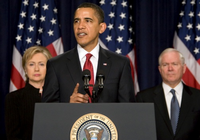
There is an important element missing in the extensive coverage of Afghanistan: multilateral diplomacy. The Obama administration has been correct to emphasize the stakes for Pakistan in Afghanistan and, by extension, the seriousness with which the U.S. takes Pakistan’s stability. But it has begun to sound like Afghanistan has only one border, and only one important neighbor. So far, the administration and the media’s portrait has oversimplified the nature of the Taliban insurgency, defining it as essentially an extension of the fragility of the Pakistani state and political system. In truth, Pakistan is probably more stable than it looks, however […]

Eight years ago, a small number of U.S. personnel, working in tandem with local Afghan leaders, entered Afghanistan with a defined aim: to punish al-Qaida and overthrow the Taliban regime that harbored them. Over the past year, that mission has morphed into the much broader objective of rebuilding the Afghan state and protecting Afghan villages. Most recently, America’s top commander in Afghanistan, Gen. Stanley McChrystal, said a new strategy must be forged to “earn the support of the [Afghan] people . . . regardless of how many militants are killed or captured.” Such an undertaking, amounting to a large-scale social-engineering […]
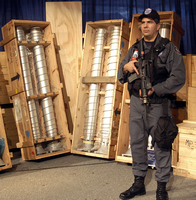
While transnational illicit flows of people, goods and technology are not a new phenomenon, it has been widely recognized that the volume of these flows has increased dramatically in the globalizing era that has followed the end of the Cold War. This increase has largely been a result of the technical innovations associated with globalization, combined with the popularization of “free trade” ideals. Simply put, the sheer volume of international trade has meant that even states of the developed world increasingly cannot control their borders. What effect has this increase in illicit flows had on states and their power in […]
Elements of the U.S. Army’s 10th Mountain Division are engaged in Afghanistan’s Wardak Province, southwest of Kabul. The division’s Bravo Company, 2nd Battalion, 87th Infantry, lost 8 killed and 25 wounded in just three months in mid-2009. Twenty-one-year-old Spc. Justin Pellerin, who was killed by a roadside bomb blast in Afghanistan Aug. 20, is one such casualty. In the days following his death, Pellerin’s friends remembered him, and mourned his loss. David Axe and Jason Reich report for World Politics Review.
